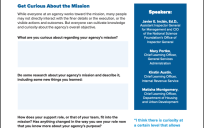There are a number of reasons why agencies should offer thoughtfully designed education and training opportunities along with regular work.
First, development encourages career advancement. It also raises morale and understanding of mission, and it improves an employee’s current job performance, said Bill Zielinski, who became CIO for the City of Dallas in mid-2020.
Zielinski came to his position after serving as assistant commissioner of the Information Technology Category in the General Services Administration’s Federal Acquisition Service, as well as in other federal and regional roles.
He finds that the combined benefits of professional development improve an employee’s overall agency experience, as they come to see themselves as high-performing and also growth-oriented. But that’s not all that professional development does.
“It improves team cohesion, improves overall employee engagement, results in higher retention rates, attracts better talent to your organization and it improves overall organizational performance,” said Zielinski.
Drawing from his experience as both a manager and an agency employee who grew through mentorship, Zielinski pointed out a few ways managers and employees can develop and maintain a growth mindset.
Development, Not Just Training
The difference between traditional job training and professional development is that the former helps you become or remain functional where you are, while the latter prepares you for somewhere else, said Zielinski.
In other words, traditional job training develops skills and competencies for a specific position, but professional development has a broader impact. Managers and employees should assess, together, how workers can continually perform well in their current roles while building skills for future positions.
As Zielinski pointed out, you won’t become an expert by doing the same tasks in the same way over and over again — even if you do them perfectly. Instead, real expertise comes from finding ways to do the tasks differently or modifying them for different situations and outcomes. That builds your knowledge over time and, perhaps most importantly, helps you contribute to the broader ecosystem of your organization.
Prepare for What’s Next
Coming from a military family, Zielinski’s thoughts always return to how individuals can anticipate the future — the next opportunity and new responsibilities — and how they can lay the groundwork for those moves.
Employees shouldn’t be so locked into their current tasks that they can’t stretch their wings, he said. Part of the reason that performance improves with a growth mindset is that people become more engaged when they see how their current efforts fuel greater career potential.
Preparation, he said, “is part of the demonstration to those who are going to make the decision that you’re ready for what comes next.”
Mentorship Matters
Managers have one of the biggest roles to play in employee development, and mentorship is a crucial EX investment.
“You need to look for ways to ensure that managers at every level are given the time and the tools to support that meaningful engagement between employees and their managers. You have to model it,” said Zielinski.
A good mentor shares the wisdom of their past experiences and provides a safe environment where an employee can seek feedback and develop ideas that will help them plan for the future. A mentor also helps people understand how their work is measured and evaluated.
Employees should have multiple mentors throughout their careers, Zielinski said, because each one will offer different knowledge and feedback.
Be Open to Unlikely Opportunities
Both managers and workers should remember that we all have undiscovered skills and interests, unknown even to ourselves. That’s why agencies should approach professional development as an opportunity to learn about employee strengths, capabilities and interests.
Zielinski believes that employes at all levels will have a better experience if they are open to a variety of learning opportunities, including for soft skills, “because even when they’re not directly related to the job that you’re doing, if you’re interacting with others or you’re operating in a broader ecosystem, then those skills that you learn will help you become better at what you’re doing and contribute to your overall success,” he said.
“Oftentimes, you will find an area of interest or something that you didn’t know you had an interest in — maybe call it a little bit of serendipity,” he added.
At the beginning, not everyone knows where their agency work — and their continued professional development — could take them. But keeping the possibility for discovery open, said Zielinski, can “really light a fire for you and will end up accelerating your career.”
This article appeared in our guide, “Tools and Tactics for Employee Engagement.” For more insights on bringing out the best in your employees, download the guide:





Leave a Reply
You must be logged in to post a comment.